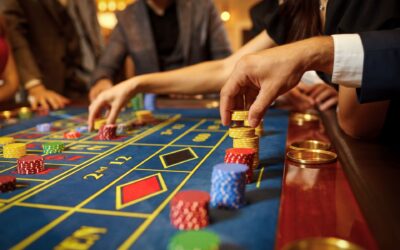#161 © Copyright 2009, all rights reserved worldwide. Gambling and the Law® is a registered trademark of Professor I Nelson Rose, www.GamblingAndTheLaw.com
It is technically not illegal for Americans to visit Cuba. To obey federal laws, all U.S. citizens have to do is not spend any money whatsoever once they set foot on the island.
Which is going to make things a little difficult. Because Cuba will have casinos within the next 10 years.
Or, more accurately, Cuba will again have casinos. Because during the 1950s the island nation, less than 100 miles from Florida, was one of the leading gaming and tourist destinations of the world.
It started in the 1920s, when Havana assumed a role later taken by Las Vegas: a vacation spot where Americans could party in ways not allowed at home. But it was not the gambling as much as it was the booze. America was in the midst of the disastrous experiment known as Prohibition, which also created modern organized crime. Cuba flourished with nightclubs, bordellos and casinos.
World War II was a minor interruption. Then the partying was reborn. Havana became so notorious, that in 1950 a Broadway musical, “Guys and Dolls,” could be built around its reputation. The audience knew why Nathan Detroit (the Frank Sinatra character in the 1955 film) bet Sky Masterson (Marlon Brando) that Sky could not convince the Salvation Army “doll” (Jean Simmons) to go with him for “dinner in Havana.”
But it looked for a while like the good times might be coming to an end. Cuban casinos had become so crooked that Americans were beginning to stay away. They were saved when Fulgencio Batista became dictator in 1952.
In an ironic twist, Batista called upon the mob, particularly Meyer Lansky, to clean things up. And they did. It is hard to believe organized crime syndicates would run completely honest games. But Lansky realized they could make more money with magnificent hotel-casinos then if they cheated everyone.
Throughout the 1950s, the American and Cuban mob families opened luxurious casino resorts, each one bigger and more successful than the last. The money poured in. Batista got a cut of everything.
Three recent books, Offshore Vegas: How the Mob Brought Revolution to Cuba; Havana Before Castro: When Cuba was a Tropical Playground (great photos); and Havana Nocturne: How the Mob Owned Cuba…and Then Lost It to the Revolution (being made into a movie), may overstate the importance of organized crime in the Communists coming to power.
The economy under Batista was not that bad. Cuba had a large middle class. Lansky was, in fact, originally reluctant to open casinos, because labor unions were so strong.
Still, most Cubans never shared the wealth they saw all around them, and corruption was rampant. The result was revolution.
When news hit the streets on New Year’s Day, 1959, that Batista had fled the country, angry crowds poured into the casinos, destroying everything inside.
As one of his first decrees, Fidel Castro outlawed gambling. He then tried to reopen some, with untrained dealers, after he discovered how important the casinos were to the local economy. But it was too late – the American patrons were gone.
The Soviet bloc never could supply enough tourists to make up for being isolated from the U.S. I remember seeing faded posters for Havana vacations in a tourist bureau in Prague, shortly after the Velvet Revolution. But the other store windows were practically empty, since there was little to buy and few people had any money, or the right to fly over the barbed wire and minefields that had surrounded Communist Czechoslovakia.
The fall of the Iron Curtain shows what we can expect for Cuba: A combination of two of the greatest expansions of legal gaming in the last 40 years.
The dissolution of the Soviet Union and the replacement of communism with capitalism lead to an explosion of casinos throughout Eastern Europe and Russia.
And the death of the dictator Francisco Franco led to an explosion of slot machines and other legal gaming throughout Spain.
Although Franco was strongly anti-communist, the comparison with Castro is apt. The Iberian peninsula and Latin America have a long tradition of strongmen, “caudilhos” in Portuguese, in Spanish “caudillos.” Franco ruled from 1936 to 1975, and even called himself “Caudillo de España, por la gracia de Dios;” which Wikipedia translates as “Leader of Spain, by the grace of God.”
Castro has been the caudillo since 1959, first as Prime Minister, then President and now as First Secretary of the Communist Party of Cuba. Due to illness, he turned over much of his power to his younger brother Raúl, on July 31, 2006.
Raúl has shown some independence. He doesn’t really have what it takes to be a caudillo. So he might start true liberalization as soon as the sickly Fidel, 83 years old, dies. Raúl is 78, so both Castro brothers will probably be gone within the next 10 years.
The caudillo tradition seems to be coming to an end. The U.S. will drop its economic embargo when democracy and capitalism come to Cuba, in whatever form they take. In fact, as we know from Macau, democracy is not the essential part of the equation. China is still Marxist, but it is hard to call it communist.
The initial breakthrough will probably take place on cruise ships, with casinos, returning to the Port of Havana. Initially, gaming will only be permitted on the high seas. But it is a short step from there to allowing the casinos to be open while the ships are docked.
Bingo machines are sweeping Latin America. These are often called Class II. Of course, there is no Class I or Class III, since the categories were created by, and apply only to, the U.S. Indian Gaming Regulatory Act. But, it is an easy way to distinguish these gaming devices from true slot machines, at least for political cover.
True casinos, with true slots and table games, are also common in much of Central and South America. But even more so in the Caribbean. A free Cuba will quickly allow casinos to reopen, in high-quality hotels designed for, and possibly even limited to, tourists.
So, I’m inviting you to G2E-IGE Havana, 2019. Given the consolidation of every part of the gaming industry, I have taken the liberty of predicting the merger of the two largest trade shows, the Global Gaming Expo, now held in Las Vegas, and the International Gaming Expo, in London.
And the conference venue should be magnificent. Castro’s Communist regime may have accidentally contributed something else to the speedy rebirth of casinos. There has been so little economic progress on the island, that apparently the ornate buildings constructed in the 1950s to house the mob’s casinos are still standing, waiting to be refurbished and reopened, under new management.
END
© Copyright 2009. Professor I Nelson Rose is recognized as one of the world’s leading experts on gambling law, and is a consultant and expert witness for governments and industry. His latest books, Internet Gaming Law (2nd edition just published), Blackjack and the Law and Gaming Law: Cases and Materials, are available through his website, www.GamblingAndTheLaw.com.





0 Comments